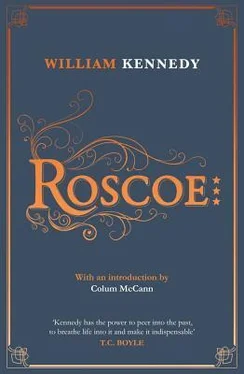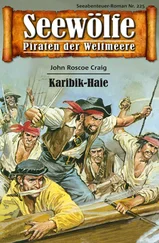Today was also different for Roscoe, the outsider about to become the intermediary; and nobody but Mac knew that yet. There was an antecedent for such a condition: late fall 1931, Jack (Legs) Diamond, still recovering from being shot in the arm, lung, and liver seven months earlier, on bail waiting for his second trial in Troy for kidnapping and torturing a trucker, here he was suddenly in the Elks Club, pulling up a chair to sit down for a little pinochle with Roscoe, Marcus Gorman, and Leo Finn, one of the Party’s aging bagmen, an ex-schoolteacher and still a bit of a literatus, who knew his Yeats and Keats and could call up fragments on cue, which amused Jack.
“So — how are all your bullet holes doing, Jack?” Roscoe asked.
“You don’t have to answer that,” said Marcus, whose fame was in a crescendo from representing Jack in court.
“They’re coming along,” Jack said.
“You don’t seem to mind being shot,” Roscoe said, “you handle it so well and so often.”
“Being shot’s not so bad,” Jack said. “The problem is getting even.”
“My buddies gut-shot me in the war,” Roscoe said.
“Accidentally on purpose?” Jack asked.
“Exactly.”
“Amazing,” said Leo. “Just what Willie wrote.”
“Willie?” said Jack. “Is that one of your old poets?”
“The same. ‘A heavily built Falstaffian man / Comes cracking jokes of civil war / As though to die by gunshot were / The finest play under the sun.’ ”
“Civil war,” Jack said. “I know about that. It was my buddies who shot me in the back with two shotguns.”
“Your war never ends, does it?” Roscoe said.
“No, but I’m too young to retire,” Jack said, and Roscoe dealt the cards.
Jack was thirty-four and had been an outsize presence in Albany all that summer, turning up at the Elks, at the best restaurants, a regular at the Kenmore’s Rainbo Room, headlines in the papers every day about his upcoming trial and his crushed mountain empire. Since the late 1920s Jack, the best-known gangster in the East, had been the Emperor of Applejack in the Catskills, doing business in eighteen counties, running beer out of the Kingston brewery he took over after Charlie Northrup disappeared, highjacking fellow bootleggers, his specialty. He’d terrorized most Catskill roadhouses and hotels into handling his goods, converted law enforcement to his persuasion — the sheriff of Greene County gave pistol permits to his whole gang, made Jack a deputy with a badge. But then Jack kidnapped and tortured Clem Streeter (burned his feet, hung him from a tree) for refusing to say where he was hauling twenty-four barrels of hard cider, the raw element of applejack. And when Clem told his story next day, well, that did it. We can stand anything but torture, said Governor Roosevelt. And in the spring of 1931, he sent state troopers and his attorney general down to rupture Jack’s empire up the middle and sideways.
Marcus won Jack a change of venue from Catskill to Troy, and Jack then transferred his wife, girlfriend, and select henchmen into a six-room suite on the second floor of the Kenmore. In July, the jury at Jack’s first Troy trial acquitted him of assaulting the trucker, and Jack the celebrity soared socially over Albany rooftops, ubiquitous in the town’s speakeasies, awaiting the second trial — another acquittal? His ultimate plan: go into business upstate, away from the Catskills, new gang, new territory, new connections.
Long story short: Jack, after the Elks Club pinochle game, offered Roscoe a business proposition — cheap beer, no matter what price he had to undercut, cheaper by a dollar a barrel than the Waxey Gordon beer Mush and Bindy were bringing into Albany. Save your money! Buy from Jack! Where was Jack getting his beer now that the troopers had closed his brewery?
“There’s beer everywhere,” said Jack, who had links to breweries in Fort Edward, Troy, Yonkers, Manhattan, Coney Island. But Jack’s beer came with Jack’s baggage. Albany Detective Sergeant Freddie Robin had been slouching on a sofa in the Kenmore lobby, assigned to watch Jack’s pals troop in and out for business and sociality: the Thorpe brothers, homegrown thugs who, a year hence, would bring in Lorenzo Scarpelli to kill Bindy and Mush; also Honey Curry and Hubert Maloy, who would evolve into kidnappers themselves in 1938, holding Bindy’s son, Charlie Boy, for ransom; plus Vincent Coll, Fats McCarthy, and Dutch Schultz, a trio of swaggering notables who had left corpses all over Manhattan in the beer wars. Newsmen had kept score on who was ahead in the corpse count, and Jack won. Did Albany need beer that came in coffins?
“Jack, your proposition sounds tempting,” Roscoe said, “but Waxey’s beer is well liked. I can’t imagine the boys switching.”
“Can you check it out with Patsy and Bindy?” Jack wondered.
“I’ll pass the question along,” said Roscoe.
When he told Patsy about the offer, Patsy said, “That fella’s going to be a serious nuisance if they don’t put him in jail.”
Roscoe at that moment became the outsider in future Jack talk: Patsy trusting him like nobody else, but keeping him apart from certain cosmic decisions. You run the Party, Roscoe, I’ll run the nighttown — as if they could be separated. But Patsy believed in separate realms of power, pitted even his closest allies against one another when it suited him. Like pitting chickens. Competitive truculence. See who survives.
And so monitoring Jack fell to O.B. and Mac. They followed him when he left the Kenmore and moved into the Wellington Hotel, next to the Elks Club. They pressured the Wellington to put him out, and followed him to the Pine Hills where he stayed with the bootlegger Nick Farr. With the Thorpe brothers, Farr was helping set up Jack’s embryonic upstate beer network. Farr’s neighbors hadn’t known what he did for a living, but they recognized Jack from the newspapers and alerted the police. O.B. and Mac told Jack he was upsetting the citizenry and was no longer welcome in Albany. Get lost, Jack.
Jack sent his wife, Alice, to her apartment on 72nd Street in Manhattan, then moved in with his girlfriend, Marion (Kiki) Roberts, upstairs over Sylvester Hausen’s card game on Nineteenth Street in Watervliet. He switched between there and a house in North Troy until the second week of December, when the trial was about to begin. He also called Bindy and said he’d dropped the idea of bringing in beer, but how about permission to go into the insurance business in Albany? Insurance meant collecting premiums that insured the buyer against Jack Diamond’s resentment of people who wouldn’t buy his insurance. Bindy, like Roscoe, passed Jack’s request on to Patsy.
Jack then rented rooms for himself and Alice; his brother Eddie’s widow, Kitty; and her seven-year-old son, Johnny, named for Jack, who were all humanizing presences at Jack’s trials. A fella with a family like that, he’s gotta have some good in him. The rooms were ten dollars a week each in one of Hattie’s houses, 67 Dove Street, rented under the names of Mr. and Mrs. Kelly.
Jack was back in Albany.
His residential slide from Kenmore luxury to a ten-dollar rooming house was strictly financial. Heavy expenses for hotels and high life, hospitals and lawyers, payoffs to politicians, keeping his women happy, were taxing. He had booze of every kind stashed in a dozen drops upstate but, being under surveillance, he couldn’t get to it to peddle it — a prisoner of his own glittering infamy. The stash, much of it originally stolen by Jack, was eventually rounded up by troopers and valued at ten million, its street price. But it wasn’t worth forty cents to Jack at the moment. He was broke.
On the afternoon of December 17, Jack, with Marcus Gorman’s assistance, was acquitted of the Clem Streeter kidnapping. He celebrated with a party at Packy Delaney’s Parody Club in Albany; fifty people — Alice, Marcus, the night crowd of gamblers, pimps, grifters, a few newspapermen, a priest, an ex-railroad cop named Milligan — came to his party. Assorted Albany detectives also came: Freddie Robin, Tuohey and Spivak from the Gambling Squad, taking notes, and O.B. and Mac, who had been at the trial and now, from their car, watched the celebrants enter and leave, all night long. About one o’clock, Jack left them all and went up to Ten Broeck Street to see Kiki in the new apartment he’d rented for her. They drank and whatnotted while his cab driver, Frankie Teller, and his lookout, Morty Besch, waited three hours for him. After four o’clock, Frankie dropped Morty downtown and drove Jack to Dove Street, then helped him climb the stoop and the inside stairs to his room. Alone, Jack undressed and fell into a drunken sleep in his underwear.
Читать дальше












